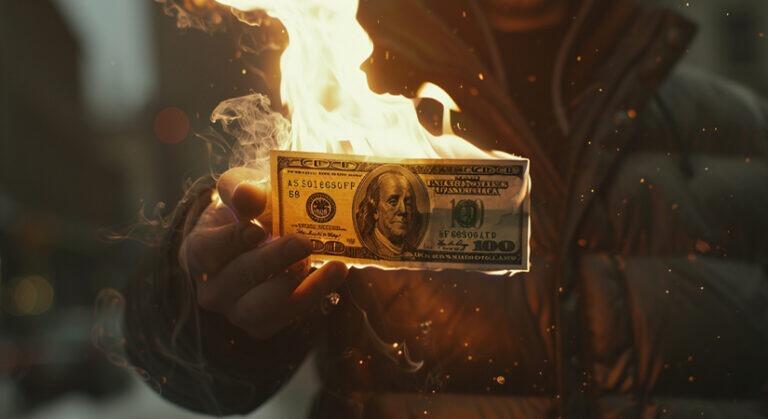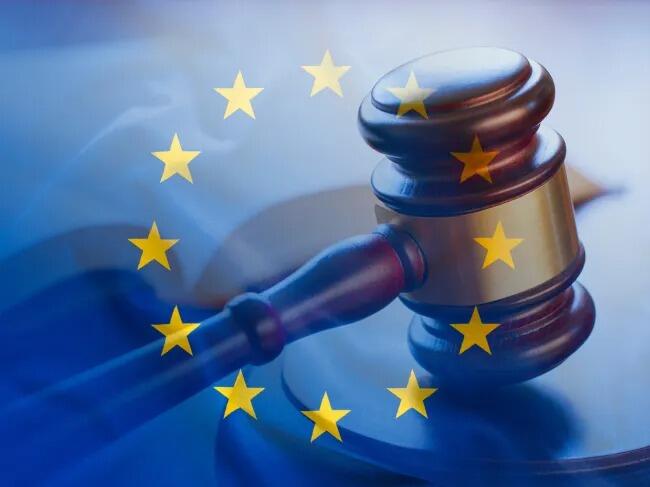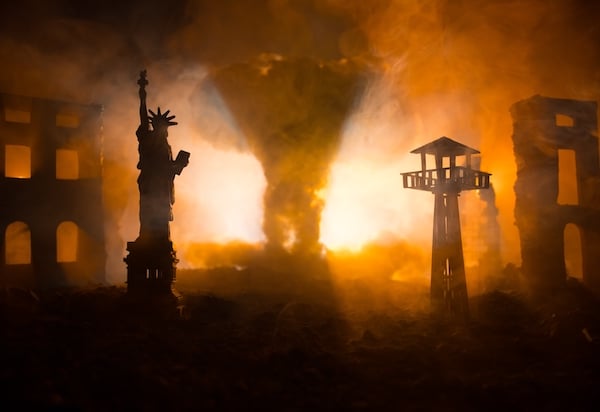Tom Luongo is partisan to say the least but that doesn't make his analysis wrong.
America just like Rome will not be conquered from the outside but will crumble from its own mistakes. And what worse mistake can you do than show the world that your money cannot be trusted? Absolutely everybody from Xi Jinping to the most remote war lord lost in a jungle in Africa gets the message loud and clear: Now is the time to get away from the dollar! (I feel some "deja vu" about this sentence!) Are the Americans mad or imbeciles? For short term gains, they are shooting themselves in the foot. The damage will be immense and can truly harm their "exorbitant advantage" according to the words of Charles de Gaulle. Madness!
Authored by Tom Luongo via Gold, Goats, 'n Guns blog,
“Birthday party, cheesecake, jelly bean, Boom!”
— R.E.M.
The world we’ve known is over.
The US Congress finally pushed the big red button. When the West froze
around $300 billion of Russia’s foreign exchange reserves in March 2022
it was the first step in breaking down the system of foreign exchange
reserves that makes up the global economy.

Freezing assets of countries they are mad at isn’t new behavior from the locusts that run the G-7 countries. We
still have to listen to conservatards whine about Obama giving Iran
back “pallets of cash” for signing the JCPOA (Iran Nuclear Deal) in
2015, when all he did was unfreeze assets we’d frozen in 1979…
…
1979, folks. Seriously. Get a grip on reality. Obama gave Iran back
their money. I’m no Obama fan, far from it, but as payments go, it was
really nothing.
Freezing assets, however, isn’t really theft, it’s just the tip.
The
money frozen in 2022 was supposed to operate the same way. It was
supposed to pressure Russian President Vladimir Putin into ending the
war in Ukraine. The theory being that the oligarchs whose money that
represented would push Putin out of power to get that money back.
Theories, by the way, speaking as a scientist, mostly suck.
Putin
used this to his advantage, rallying the world around him and to the
burgeoning BRICS Alliance. It worked a treat and here we are with $90
per barrel oil, raging inflation and a shattered Ukraine.
Typically, the British call this, “money well spent.”
Overall, it was a statement by the G-7 that no one’s money is safe.
Look, no offense to Iran (or Venezuela or anyone else who previously
ran into this problem), but cutting them out of the global economy was
an effective piece of intimidation of everyone else.
It had it’s limits, however. And the increasingly common usage of sanctions while possibly effective in enforcing the rules based order demanded
by the G-7, only decreased the cost/benefit analysis of playing by
those rules in the future. Eventually someone would turn what was
supposed to be a weakness into a strength.
No
self-proclaimed ‘serious person’ in DC, London and/or Brussels thought
that doing something so arrogant (and stupid) to one of the most
important commodity-producing countries in the world would backfire on
them. When you stop to think about it we’re talking about a
country, Russia, that in 2023 exported more wheat than the 3rd largest
producer (the US) harvested — approx. 60 million tonnes exported (RUS)
vs. 47 million tonnes produced (US).
So, like the hubristic morons they are, our leadership thought this would work. It didn’t.
Or was their plan even dumber?
Because the recent actions by the US vis a vis Russia and China is so dumb it defies description. Congress has authorized President Joah Bii-DEN! to seize Russia’s foreign exchange reserves as they have threatened to do for the past six months and hand the money to Ukraine.
This isn’t the tip anymore, this is just outright theft.
And they call this #winning.
Leaving
aside the inconsolable butthurt this move implies, it really signifies
that this may have actually been the plan all along.
In their April 26th livestream, the Alexes at The Duran brought up the brilliant point that the real target of this move to seize Russia’s forex reserves wasn’t Russia, but China. (START AT the 3:00)
By
all accounts the US has frozen a small portion of the $300 billion of
Russia’s money sitting around now collecting interest because of Jerome
Powell. But in the Age of Bii-Den! no foreign policy blunder is too
small, no shakedown attempt to brazen, and no act of diplomatic
vandalism too destructive.
Sec. of State Antony Blinken’s
‘performance’ in Beijing was nothing short of a declaration of war, as
Alex Mercouris put it, and he’s absolutely right. It’s good to see both
of them come to the same conclusion I reached during the first days of
the Bii-Denn! Junta…
… that they are trying to destroy the United States.
So,
all in all, the threat hangs out there that the G-7 stands ready to
seize Russia’s forex reserves, which is an implicit threat to China that
the US will cancel all outstanding debts owed to China because we are
at war with them.
Because this is exactly where this leads.
Russia
famously sold all of their US Treasury reserves in 2021 in preparation
for war with NATO over Ukraine. There were no CUSIPs to cancel
unilaterally by the US. As always, Vlad is one step ahead of the
predictably brutish neocons at the US Dept. of State.
Even though
Vicky the Hutt is gone and the US is offering a few fig leaves to Russia
here and there to simulate attempts at opening up a diplomatic end to
Ukraine, Russia is looking at Blinken, David Cameron (UK), Josep Borrell
(EU) and the rest of the Gang that Can’t Sanction Straight and calmly
saying, “Nyet. Fuck you, pay me.”
And, by all accounts, the EU is paying Russia while Bii-Denn! tries to open up global oil markets in
a desperate bid to bring oil prices down because “Our Money, Your
Problem” is now “Our Commodities, Your Political Unrest” or something
like that.
This speaks to the heart of this matter, there
is no trust left between these ‘combatants’ and, by extension, the rest
of the world. Global trade rests on trust. Trust that if you do
business in one country, what you’ve personally earned is considered
your property. If that trust is broken it’s not likely not coming back
anytime soon.
Seizing those assets is simply spitting in the eye of the very ideas on which Pax Americana was built.
You can say it was always a lie and that’s your prerogative, but the
key to continuing any good racket is not to shake down the mark to the
point where he sees the grift.
I guess they no longer teach that at Globalist Central.
The
saddest part about this is that, truly, the target of this insanity
isn’t even China or Russia or Iran… the real target is us, the people
who are responsible for the debt their inanity represents. The real
problem is that they are broke, are about to break all of the promises
of the past two generations, and want you to believe it was Russia and
China’s fault.
But these people are simple, garden variety
narcissistic abusers, who sit there in their ivory towers nursing the
holes where their hearts are supposed to be, screaming, “Why are you
making me beat you like this!”
Why indeed?
BOOM!
I was contacted by Sputnik News for
comments on this issue which were far more professional than those I
just typed. As always, in the interests of transparency, I publish the
full comments for your confirmation of whatever you think of me. :)
The
US House passed legislation that would give Biden the legal authority
to confiscate frozen Russian financial assets and transfer to them to
Ukraine.
1. If the US really does pull the trigger and
confiscates Russia’s financial assets, what are some of the potential
consequences for the hegemony of the US dollar and financial system?
I
could write a book on this issue, to be honest. But, in short, nothing
good. What this would do is ensure the US is no longer a place where
trade and business are protected by law. Congress is literally throwing
the entire concept of foreign exchange into the trash can and lighting
it on fire by giving President Biden this power, which no one should
have.
This isn’t about Russia or anyone’s opinion about what they
are doing in Ukraine. This is about the US as a bastion for the rule of
law as it pertains to business and banking. Now, we’ve been trending
towards this moment for the past two decades, but this would be a move
from which the current US government cannot and will not recover from.
It
will signal to the rest of the world that their money is no longer safe
from confiscation if it is held in US banks. That at any time if
someone in Congress has a grudge against you, they can just seize it and
move on. We Americans have lived under the spectre of ‘asset
forfeiture’ laws for years as a consequence of our “War on Drugs” during
the Reagan administration. The corruption it created is legendary.
Every
country looking to do business with the US in the future now lives with
that. This one act is what signals the end of the modern era of
finance and trade. From here the world will fracture and the US will
lose trillions in future trade. This confirms my argument that US
leadership are vandals intent on the collapse of the US rather than
having any allegiance whatsoever to the people or what’s left of the
ideals on which the country was founded.
2. How are other
countries likely to react to such a move? Are there any other
alternatives to the US dollar and financial system that they could turn
to?
This move will not have immediate effects that we’ll see play
out in capital markets beyond accelerating trends already in place. As
of right now there is no alternative to the US dollar because of its
primacy in settling global trade. The euro gave up that potential role
when they went to negative interest rates last decade.
The Chinese
yuan is not ready for this role either. But with this move by the US,
it will now gain momentum towards fulfilling that role. And, believe me,
the Chinese government is fully aware of this.
In the short run,
paradoxically, it will cause a run into the US dollar, as people who
need them to service debt will hoard them, but with the intention of
paying those debts off. This will put upward pressure on the dollar
making our sovereign debt that much harder to service. The vandals of
the Biden administration are fully aware of this, and if anything, are
cheering it on.
But once trust is broken it is nearly impossible
to regain it. Capital flows to where it is treated best. This was the
US’s real super-power for all of these years. We treated capital well.
It’s what drove our banking dominance. That dominance will fade and
the world, in the short term, will turn to gold until a new system
emerges.
3. US lawmakers are constantly saying that giving more
money to the US military industrial complex via Ukraine spending is
great for the economy, creates jobs. Is that actually the case?
Yes,
most of the money isn’t actually going to Ukraine. I suspect that most
of it is going to replace what we’ve already stripped from ours and the
rest of NATO’s stores. This money is just ensuring that the war wanted
so desperately by the people who stand behind our politicians is fully
funded.
War is not good for the economy, it diverts precious
capital from productive innovation into weapons and bombs. As always,
all they sell us on is the stuff that is seen, the jobs for making
bombs. What they ignore are the costs to that, the unseen things we
didn’t build with that same money that would alleviate future needs.
It’s just pathetic grandstanding and it’s why representative Republics
always fail the same way.
Creating jobs is a politician’s
priority, but it isn’t in the people’s priority. What the people want
is to not be looted and create their own opportunities. But that implies
we don’t need the politicians, which we don’t, and we can’t have that
gaining traction, now can we?










